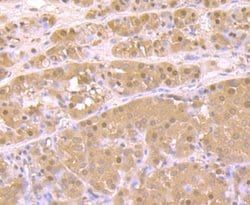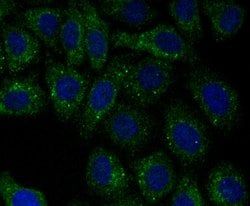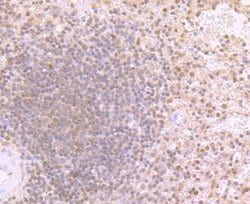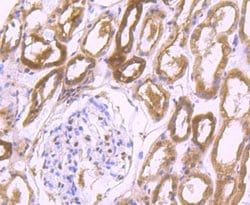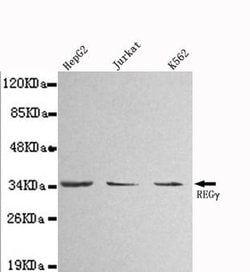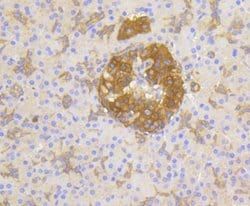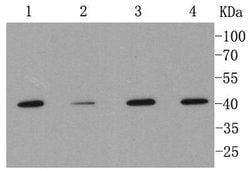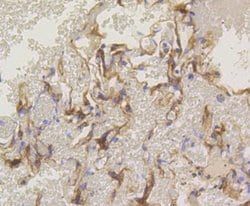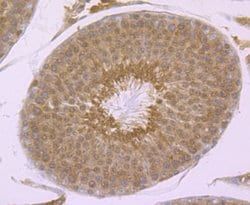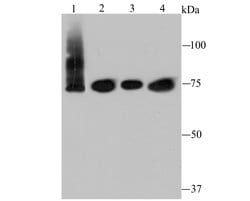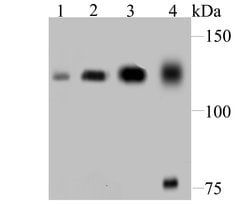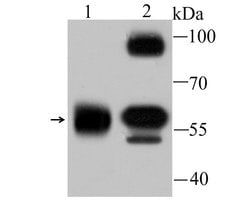PSMA1 Recombinant Rabbit Monoclonal Antibody (JU66-24), Invitrogen™
Manufacturer: Thermo Scientific
Select a Size
| Pack Size | SKU | Availability | Price |
|---|---|---|---|
| Each of 1 | PIMA532806-Each-of-1 | In Stock | ₹ 47,748.50 |
PIMA532806 - Each of 1
In Stock
Quantity
1
Base Price: ₹ 47,748.50
GST (18%): ₹ 8,594.73
Total Price: ₹ 56,343.23
Antigen
PSMA1
Classification
Monoclonal
Concentration
1 mg/mL
Formulation
TBS with 0.05% BSA, 40% Glycerol and 0.05% sodium azide, pH 7.4
Gene Accession No.
P18420, P25786, Q9R1P4
Gene Symbols
PSMA1
Immunogen
Synthetic peptide within Human PSMA1 aa 214-263
Quantity
100 μL
Primary or Secondary
Primary
Target Species
Human, Mouse, Rat
Product Type
Antibody
Isotype
IgG
Applications
Flow Cytometry, Immunocytochemistry, Immunohistochemistry, Western Blot, Western Blot
Clone
JU66-24
Conjugate
Unconjugated
Gene
PSMA1
Gene Alias
20S proteasome subunit C2, 30 kDa prosomal protein, alpha-type, C2, epididymis secretory protein Li 275, HC2, HEL-S-275, macropain subunit C2, macropain subunit nu, MGC14542, MGC14575, MGC14751, MGC1667, MGC21459, MGC22853, MGC23915, multicatalytic endopeptidase complex subunit C2, NU, PROS30, PROS-30, proteasome (prosome, macropain) subunit, alpha type 1, proteasome (prosome, macropain) subunit, alpha type, 1, proteasome 20S subunit alpha 1, proteasome alpha 1 subunit, proteasome component C2, Proteasome nu chain, proteasome subunit alpha 1, Proteasome subunit alpha type-1, proteasome subunit nu, proteasome subunit, alpha-type, 1, protein P30-33K, PSC2, Psma1, testicular tissue protein Li 150
Host Species
Rabbit
Purification Method
Protein A
Regulatory Status
RUO
Gene ID (Entrez)
26440, 29668, 5682
Content And Storage
Store at 4°C short term. For long term storage, store at -20°C, avoiding freeze/thaw cycles.
Form
Liquid
Description
- Recombinant rabbit monoclonal antibodies are produced using in vitro expression systems
- The expression systems are developed by cloning in the specific antibody DNA sequences from immunoreactive rabbits
- Then, individual clones are screened to select the best candidates for production
- The advantages of using recombinant rabbit monoclonal antibodies include: better specificity and sensitivity, lot-to-lot consistency, animal origin-free formulations, and broader immunoreactivity to diverse targets due to larger rabbit immune repertoire
- Proteolytic degradation is critical to the maintenance of appropriate levels of short-lived and regulatory proteins as important and diverse as those involved in cellular metabolism, heat shock and stress response, antigen presentation, modulation of cell surface receptors and ion channels, cell cycle regulation, transcription, and signaling factors
- The ubiquitin-proteasome pathway deconstructs most proteins in the eukaryotic cell cytosol and nucleus
- Others are degraded via the vacuolar pathway which includes endosomes, lysosomes, and the endoplasmic reticulum
- The 26S proteasome is an ATP-dependent, multisubunit (approximately31), barrel-shaped molecular machine with an apparent molecular weight of approximately2
- 5 MDa
- It consists of a 20S proteolytic core complex which is crowned at one or both ends by 19S regulatory subunit complexes
- The 19S regulatory subunits recognize ubiquitinated proteins and play an essential role in unfolding and translocating targets into the lumen of the 20S subunit
- An enzymatic cascade is responsible for the attachment of multiple ubiquitin molecules to lysine residues of proteins targeted for degradation
- Several genetic diseases are associated with defects in the ubiquitin-proteasome pathway
- Some examples of affected proteins include those linked to cystic fibrosis, Angelman's syndrome, and Liddle syndrome.
